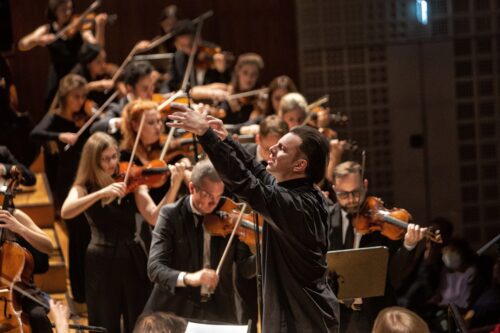 Switzerland Alexei Retinsky, Mahler: musicAeterna / Teodor Currentzis (conductor). Kultur- und Kongresszentrum (KKL) Lucerne, 8.10.2021. (JR)
Switzerland Alexei Retinsky, Mahler: musicAeterna / Teodor Currentzis (conductor). Kultur- und Kongresszentrum (KKL) Lucerne, 8.10.2021. (JR)

Alexei Retinsky – Anapher for symphony orchestra
Mahler – Symphony No.5
Star rebel conductor Teodor Currentzis and his orchestra musicAeterna (formerly based in the Russian city of Perm, now transferred to St Petersburg) are starting a mini-world tour with his interpretation of Mahler’s sprawling Fifth Symphony. Before appearing in New York, Vienna, Berlin and Tokyo, he came to the KKL in Lucerne.
Vetted for our COVID-19 certificates on entry, it was a delight not to have to wear a mask anywhere in the concert hall.
Before the Mahler, Currentzis introduced us to a short work, contemporary Russian music by Alexei Retinsky. He is an Austrian composer, born in the Crimea of Russian-Ukrainian origin, and the first Resident of the musicAeterna Composers’ Workshop in St Petersburg. Retinsky is a graduate of Zurich University of the Arts and the University of Music and Performing Arts in Graz. His new piece, entitled Anapher, has been composed for a large symphony orchestra, including an electric guitar, three ‘semantrons’ (a wooden plank hung sideway, struck instead of a bell such as in an Orthodox church) and – wait for it – one hundred water-pipes. To quote the programme note verbatim: ‘The juxtaposition of classical instrumentation and atypical instruments is based on the dramaturgical concept of a qualitative transition into a new state. The texture leaves the conventional axis system and crosses the boundaries of legitimate temperaments and tonal hierarchies – and as it turns out in the end – the seemingly derailed train is equipped with wings.’ Which is longhand for: music outside the usual boundaries.
The piece starts with the sound of caterwauling (on the water pipes) and then the percussion opens the piece with sounds sundry and strange. The double basses are asked to tap their bows sideways at the very top of their finger boards; the flutes and piccolos shrieked. The best part of the piece is some rhythmic bashing of the semantrons but give me Steve Reich’s Drumming anytime. The audience was restless, the piece lasted over twenty minutes; Retinsky’s fan club went ecstatic at the end. It was certainly a most unusual work, a soundworld to which we are not accustomed.
After the interval, even the neurotic Mahler managed to calm the soul. Last time I saw and heard MusicAeterna in Lucerne, they were dressed like monks; this time they reverted to fairly traditional concert attire. The violins and violas all stood throughout the symphony, the woodwind and brass rose when playing solos; this certainly added to the immediacy of the performance. The splendid acoustics of the KKL also helped greatly.
There were fine, if not flawless, contributions from all principals. The hyperactive, floppy-haired, diminutive leader was too distracting for my taste; he just would not keep still and launched himself into the air at every opportunity, while his co-leader was rooted to the spot. Every player attacked their instruments with gusto. It reminded me of the early concerts of the Simón Bolívar Youth Orchestra, though these Russian players perform at a higher level.
And what of the performance? Currentzis is certainly not everyone’s cup of tea. One expects the unconventional from this conductor. He had clearly thought through not just about every phrase but virtually every note of this complex work, and there was certainly much which was new to the ear. However, extremes of both tempi and dynamics took one’s attention from the symphony itself; he virtually dissected the piece without then re-assembling it to create a cohesive whole. The cello melody at the start of the second movement was nigh inaudible. The famous Adagietto was taken very slowly, Currentzis allowing himself an indulgent wallow and a distinctly languid longueur.
One knows in advance that attending a Currentzis concert will be unusual, unconventional and potentially exciting. One may well prefer more traditional performances of works one knows and loves – but that is not this conductor’s point.
If you are tempted to watch the performance, it was filmed for Medici TV and here is the link (click here) to the broadcast available on the evening of 10th October:
John Rhodes
